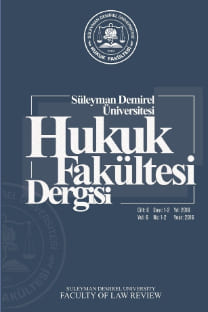İKLİM DEĞİŞİKLİĞİ VE DÜNYA MİRASININ KORUNMASI
İklim Değişikliği, Kültürel ve Doğal Miras, IPCC, UNESCO, UNFCCC
CLIMATE CHANGE AND THE PROTECTION OF WORLD HERITAGE
Climate Change, Cultural and Natural Heritage, IPCC, UNESCO, UNFCCC,
___
- Akipek, S. (1999). Ulusal ve Uluslararası Hukuk Açısından Kültür Malları. Ankara: Turhan Kitabevi.
- Brimblecombe, P. (2014). Refining climate change threats to heritage. Journal of the Institute of Conservation, 37(2), 85-93.
- Carducci, G. (2014). What Consideration is Given to Climate and to Climate Change in the UNESCO Cultural Heritage and Property Conventions? S. v. Schorlemer, & S. Maus içinde, Climate Change as a Threat to Peace Impacts on Cultural Heritage and Cultural Diversity (s. 129-140). Frankfurt: PL Academic Researh.
- Chechi, A. (2014). The Cultural Dimension of Climate Change: Some Remarks on the Interface between Cultural Heritage and Climate Change Law. S. v. Schorlemer, & S. Maus içinde, Climate Change as a Threat to Peace Impacts on Cultural Heritage and Cultural Diversity (s. 161-198). Frankfurt: PL Academic Research.
- Fatorić, S., & Biesbroek, R. (2020). Adapting Cultural Heritage To Climate Change İmpacts in The Netherlands: Barriers, Interdependencies and Strategies For Overcoming Them. Climatic Change, 162, 301-320.
- Fatoric, S., & Seekamp, E. (2017). Are cultural heritage and resources threatened by climate change? A systematic literature review. Climatic Change(142), 227-254.
- Gruber, S. (2011). The Impact of Climate Change on Cultural Heritage Sites: Environmental Law and Adaptation. Carbon & Climate Law Review, 209, 209-2019.
- Hafner, A., & Underwood, C. (2020). Introductıon To The Impact Of Clımate Change On Underwater Cultural Herıtage And The Decade Of Ocean Scıence For Sustaınable Development 2021–2030. A. Hafner, H. Öniz, L. Semaan, & C. Underwood içinde, Heritage Under Water at Risk, Threats, Challenges and Risks. (s. 118-126). Bern: ICOMOS ve ICUCH.
- Hambrecht, G., & Rockman, M. (2017). International Approaches to Change and Cultural Heritage. American Antiquity, 82(4), 627-641.
- Harkin, D. v. (2020). Impacts of climate change on cultural heritage. MCCIP Science Review, 616-641.
- Huggins, A. (2007). Protecting World Heritage Sites from the Adverse Impacts of Climate Change: Obligations for States Parties to the World Heritage Convention. Austarilan International Law Journal, 14, 121-136.
- IPCC. (2007). Climate Change 2007: The Physical Science Basis. Contribution of Working Group I to the Fourth Assessment Report of the Intergovernmental Panel on Climate Change. Cambridge and New York: Cambridge University Press.
- Karakaya, E. (2016). Paris İklim Anlaşması: İçeriği Ve Türkiye Üzerine Bir Değerlendirme. Adnan Menderes Üniversitesi, Sosyal Bilimler Enstitüsü Dergisi, 3(1), 1-12.
- Kim, H.-E. (2011). Changing Climate, Changing Culture: Adding the Climate Change Dimension to the Protection of Intangible Cultural Heritage. International Journal of Cultural Property, 18, 259-290.
- Lenzerini, F. (2014). Protecting the Tangible, Safeguarding the Intangible: A Same Conventional Model for Different Needs. S. v. Schorlemer, & S. Maus içinde, Climate Change as a Threat to Peace Impacts on Cultural Heritage and Cultural Diversity (s. 141-160). Frankfurt: PL Research Academy.
- Perez-Alvaro, E. (2016). Climate change and underwater cultural heritage: Impacts and challenges. Journal of Cultural Heritage(21), 842–848.
- Quirico, O. (2012). Key Issues in the Relationship between the World Heritage Convention and Climate Change Regulation. S. Borrelli, & F. Lenzerini içinde, Cultural Heritage, Cultural Rights, Cultural Diversity: New Developments in International Law (s. 391-412). Leiden: Martinus Nijhoff.
- Terrill, G. (2008). Climate Change: How Should the World Heritage Convention Respond? International Journal of Heritage Studies, 15(8), 388-404.
- Thorson, E. J. (2007). The World Heritage Convention & Climate Change: The Case for a Climate-Change Mitigation Strategy beyond the Kyoto Protocol. W. C. BURNS, & H. OSOFSKY içinde, Adjusting Climate Control: Sub- National, National and Supra- National Approches . Cambridge: CUP.
- Türkay Kahraman, Ş. (2018). Uluslararası Silahlı Çatışmalar Hukukunda Kültürel Varlıkların Korunması. İstanbul: XII Levha Yayıncılık.
- UNESCO. (2015). World Heritage Climate Change No: 77. London: Publishing for Development Ltd.
- UNESCO World Heritage Centre. (2007). World Heritage Reports 22. Paris: UNESCO.
- WEITZMAN, M. L. (2007, September). A Review of The Stern Review on the Economics of Climate Change. Journal of Economic Literature, XLV, 703-724.
- ISSN: 2146-7129
- Yayın Aralığı: 2
- Başlangıç: 2011
- Yayıncı: SÜLEYMAN DEMİREL ÜNİVERSİTESİ HUKUK FAKÜLTESİ
BAŞKANLIK SİSTEMİNİN UYGULANDIĞI GÜNEY KORE’DE KANUNLARIN YAPIMINDA YASAMA VE YÜRÜTMENİN ETKİNLİĞİ
TÜRKİYE’NİN E-DEVLET KAPISI (DİJİTAL TÜRKİYE PORTALI)
TACİRİN ELİNDE BULUNAN FATURAYA İSTİNADEN İHTİYATİ HACİZ
KAMBİYO SENETLERİNE ÖZGÜ HACİZ YOLUYLA TAKİPTE MENFİ TESPİT DAVASININ NİTELİKLERİ
SPOR MÜSABAKALARINDA YASADIŞI BAHİS VE ŞANS OYUNU SUÇLARI
AUTOPENLE VEYA DİJİTAL EKRANA ATILAN İMZA İLE ELLE ATILAN İMZANIN KARŞILAŞTIRILMASI
HAKARET SUÇUNDA İSNADIN İSPATI HAKKININ HUKUKİ NİTELİĞİ
